Best Natural & Cultural Savory to Western Sichuan, Leshan & Emei
The large Sichuan Province boasts abundant wonderful landscapes and interesting profound culture of various types for a wonderful trip memory! This 8-day itinerary is the best combo for you to savor the wonderful diversity of scenery and culture essences in vast Sichuan. You will not only have great fun in Western Sichuan to explore the beautiful alpine sightseeing of lakes, mountains, valleys, grassland, villages, Tibetan monasteries, etc. at Mount Siguniang, Danba, Xinduqiao, Tagong, etc. by car driving, but also, make a worthy visit to the UNESCO World Natural and Cultural Heritage splendors at Leshan Giant Buddha and Mount Emei to see the quite different Sichuan basin natural views from down to top and enjoy the Chinese Buddhist culture with sacred visit to different temple sites and the must-go Golden Summit with relaxing hiking and cruising experience. Let’s go to discover the diversity of Sichuan nature and culture!
Welcome to Chengdu, the hometown of the Giant Panda. Your local guide will meet you at the airport/train station and then escort you to your hotel in a private vehicle. The rest of today is yours to relax in the panda city on your own.
Arrival Ideas: Chengdu is only about 2~3 hours flying from the majority of big cities in China, such as Beijing, Xian, Shanghai, Guangzhou, etc. You can also get to Chengdu by high speed trains from Xian (4hrs), Chongqing (1hrs), Guilin (6hrs), Kunming (6hrs), etc.
On this day, your driver and guide will pick you up at your hotel. The following journey will be a scenic driving from Chengdu to Mount Siguniang, about 205 kilometers away (about 4 hours). Leave the flat Chengdu Plain and travel onwards and upwards through the sea of clouds of Balang Mountain (altitude: 4,532 meters). Then, stop at Maobiliang Ridge (Bridge of Cat’ Nose) which is the top best location to enjoy the panorama of Mount Siguniang. After that, you’ll arrive in Siguniangshan Town (altitude: 3,200 meters).
After lunch, you’ll be transferred to visit Shuangqiao Valley, the left one of the three valleys about 7 kilometers from Siguniangshan Town. With a full length of 34.8 kilometers, Shuangqiao Valley is regarded as the most beautiful valley in Mount Siguniang National Park. Take the sightseeing bus directly up to the end of the valley and visit Larch Forest (altitude: 3,850 meters) surrounded by snow-capped peaks in three sides. Then, take sightseeing bus down the valley passing vast grassland, white pagoda, prayer flags, lush meadow with flowers, and make stops to hike and explore along the way. Have some leisure time at Fishing Bay, Bonsai Beach, Ten-mile Polar Trees...In this valley, you’ll travel through the varying alpine scenery belt with breathtaking landscape.
After the visiting, your guide and driver will escorted you the hotel at Siguniangshan Town and help you check in. Have a good rest and stay overnight in this town.
 Balang Mountain Sea of Clouds
Balang Mountain Sea of Clouds
 Shuangqiao Valley Bonsai Beach Landscape
Shuangqiao Valley Bonsai Beach Landscape
 Emerald Fish Beach at Shuangqiao Valley
Emerald Fish Beach at Shuangqiao Valley
 Mount Siguniang Appearance from Maobiliang
Mount Siguniang Appearance from Maobiliang
After breakfast, you’ll begin your hiking journey in either Changping Valley or Haizi Valley. Changping Valley is a mature valley designed with sightseeing bus, plank road, hiking trail and horse riding and it is also the nearest valley to catch the beauty of Mount Siguniang. While Haizi Valley is wilder and more primitive than Changping Valley, offering best location to shoot Mount Siguniang. (Note: Each valley takes about one full day which means you can only choose one to do on this day, and you’d better tell your likes to us beforehand.)
Hiking experience in Changping Valley: first take a sightseeing bus to Lama Temple (5 km) which is the starting point of your hiking. The following hiking is composed of two parts - hiking on the plank road and hiking from the ending of the plank road to Muluozi. In the first part, you will see solemn monastery, waterfalls, deep valleys, ancient withered trees standing in lakes; and in the second part, you’ll walk through wild forests, follow the walking trails along the clear streams to chase some landscape you have never seen - sea buckthorn forest, red stones arrayed by nature, peaks like camel, mushrooms, pure plateau lakes reflecting the giant peaks, flocks and herds leisurely wandering, snow-capped Four Girls Mountains, magnificent glacier…you will return back to Lama Temple after reaching Muluozi. The whole hiking needs about 8 hours. Last, take a sightseeing bus to go out.
Hiking experience in Haizi Valley: Your hiking is composed of two sections. The first half of Haizi Valley hiking features in walking on plateau meadows and having the most magnificent views of Mount Siguniang - dominating snow peaks under clear blue sky, cloud sea, flag clouds... Stop for a while at Chaoshanping which is the best location to photograph Mount Siguniang. The second half of Haizi Valley hiking lets you revel in the best photographic works shot by best photographers in the world - lakes which mostly are wide and large, and surrounded by high mountains with diverse sceneries of different colors. The pure water reflects all the scenery clearly in the lake like mirrors... You will stop at Dahaizi Lake and return back to Siguniangshan Town. The whole hiking today takes about 8-9 hours.
Important Travel Tips: 1) The scenic area also provides horse for transferring luggage and riding in case you get tired of walking; 2) You can decide how long you want to hike based on your physical condition at that time; 3) Altitude changing: the altitudes range from 3,200 meters to 3,670/3,800 meters along the way. Try to avoid strenuous activity to prevent from possible high altitude sickness. 4) You’d better bring sun cream, sun glasses to protect yourself from strong sunlight; 5) There is no any restaurant in the valley, so you have to bring some food and drinks with you.
 Lama Monastery at Changping Valley
Lama Monastery at Changping Valley
 Changping Valley Muluozi in Autumn
Changping Valley Muluozi in Autumn
 Dahaizi Lake at Haizi Valley
Dahaizi Lake at Haizi Valley
 Mount Siguniang View from Haizi Valley
Mount Siguniang View from Haizi Valley
In this morning after breakfast, you’ll be taken to Danba County (altitude: 1,893 meters) with 2.5 hours’ drive and first visit Jiaju Tibetan Village, honored as the most beautiful village in China by Chinese National Geographic. In Danba County, there are over 180 Tibetan villages, while Jiaju is the best example to well preserved Jiarong Tibetan culture. Standing at the observation decks and capture panoramic scene with numerous Tibetan stone houses stretching from Dajin River valley and settled level by level to the foot of Kapama Mountain. Hike down from the observation deck to have a look at the featured Tibetan houses among the farmlands and trees and you can see many locals dressed in traditional Jiarong Tibetan costumes - most of them are smiling to you with friendliness. If you like, you can pay a visit to one of the Tibetans’ home to have deep understanding about their house construction, decoration, real life and other Jiarong customs.
After the visiting, reach Danba County and stay overnight there.
 Jiaju Tibetan Village
Jiaju Tibetan Village
Danba is renowned as “A Place with Hundreds of Ancient Watchtowers” with over 2,000 years’ history. And this morning, you’ll have the chance to see many towers in Suopo Village, the most concentrated Tibetan village with 172 Danba towers in the world. The original building of the towers were used to suppress demons, later they became fortresses to protect families from aggressive enemies. Stand at Suopo platform to appreciate the whole village rising from Dadu River Valley to the peak, dotted with numerous Tibetan-styled houses in red, white and black, and ancient towers erecting among the green lush trees. Different shapes of the towers can be seen here - in quadrilateral, pentagonal, and hexagonal.
After that, drive for about 2.5 hours to Tagong and visit to Tagong Monastery. Tagong means “A Land Favored by Bodhisattva” in Tibetan language and a legend goes that Princess Wencheng on the way to Lhasa for her wedding to Tibetan King, she was attracted by the breathtaking scenery of Tagong and left the life-sized statue of the Shakyamuni at the age of 12 here. Reputed as “Little Jokhang Temple”, Tagong Monastery belongs to Sakya Sect with a history over 1,000 years. You can go inside and see the pilgrims worshiping. Later, enjoy some peaceful time to take a walk on the green Tagong Grassland and overlook the snow-capped magnificent Yala Mountain (5,884 meters) in a distance. Enjoy the harmonious scene with numerous yaks and sheep grazing on the fertile grassland under the blue sky; and if you are interested, you can rent a horse to explore happily with a visit to herder’s home (pay the expense on your own).
After the visiting, you’ll be sent to your hotel. Have a good rest!
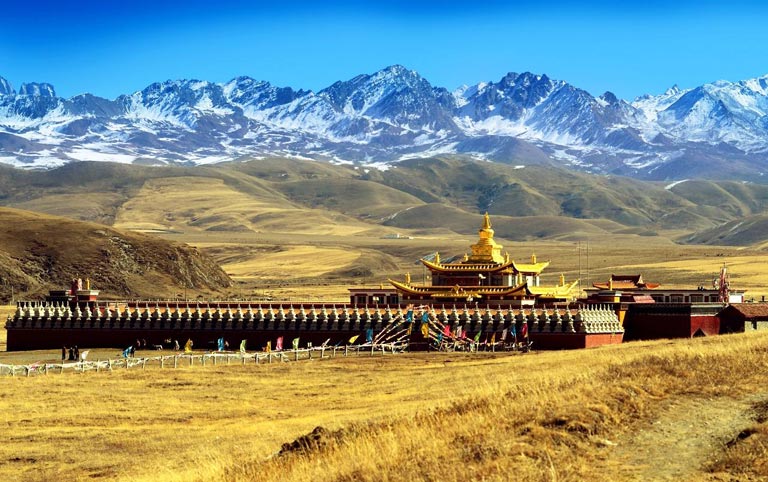 Tagong Monastery in Autumn
Tagong Monastery in Autumn
 Yala Snow Mountain Morning View from Tagong Monastery
Yala Snow Mountain Morning View from Tagong Monastery
 Suopo Village
Suopo Village
After breakfast today, say goodbye to this beautiful grassland with a scenic driving to Xinduqiao which is called “A Paradise for Photographers”. On the way, wild flowers blooming by the winding river, golden poplar forests showing their elegance on the two sides of the road, Tibetan-styled houses scattered among the farmland, roaming yaks and goats...you’ll immerse into the picturesque landscape along the way. Next, it’s time to pass through Zheduo Mountain at an altitude of 4,298 meters through many bends on the way, and feast your eyes with countless breathtaking snow-capped mountain sceneries. You have the chance to capture the panoramic view of Mount Gongga with many peaks standing in a row above the sea of clouds. Then, you’ll be driven directly to Leshan City for accommodation (about 4.5 hours’ driving).
 Xinduqiao Town Countryside Scenery in Autumn
Xinduqiao Town Countryside Scenery in Autumn
In the morning, you will be picked up at your hotel, and then be driven to visit the UNESCO World Heritage Site - Leshan Giant Buddha which is carved into a mountain rock cliff and overlooking the river below him. As the largest and tallest Buddha statue, he enjoys a total height of 71 meters, with 14.7-meter long and 10-meter wide head, 7-meter long ears, 8.5-meter broad insteps and 8.5-meter long toes. Even his one fingernail is taller than an averagely-tall people. The Giant Buddha was constructed in AD 713 to bless the boatmen from swift currents in river hollows. In spite of long history of over 1300 years, it is well-preserved because there is a smart water-drainage system designed inside the body to prevent weathering.
You can start your close sight of his magnitude from the top mountain, opposite the Buddha head, and then walk down a plank stairway to his feet from a Liliputian perspective. After the close view of Giant Buddha, leave the scenic area and appreciate a 30 minutes' amazing boat experience. The boat will drive you to front of the Giant Buddha and appreciate a wonderful panoramic view of him.
After the Giant Buddha visit, drive about a half hour to Baoguo Temple, the biggest temple of Mount Emei at the mountain foot. It has several serene gardens with rare plants, a library of sutras and a huge porcelain Buddha. Another famous historical relic in the temple is the 25-ton bronze Bell, reputedly as the second largest bell in China. While traveling deeper into the temple, you will enjoy different views of Mount Emei.
Lastly, drive to check in your hotel. Have a good rest for tomorrow’s Mount Emei trip which has some walking involved.
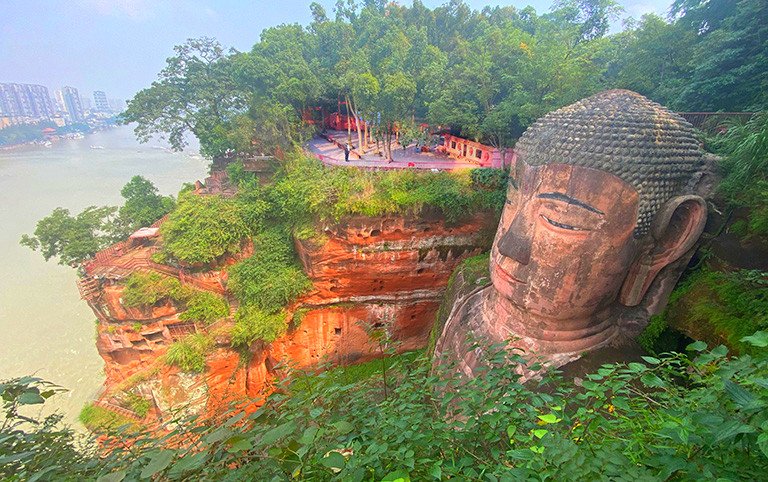 Leshan Giant Buddha in summer
Leshan Giant Buddha in summer
 Baoguo Temple at the foot of Mount Emei
Baoguo Temple at the foot of Mount Emei
This morning after breakfast, meet your tour guide and set out for Mount Emei. As one of the few World Heritage Sites of both cultural and natural heritages, Mount Emei is an enchanted combination of lush forest and cultural relics. It is one of the Four Great Buddhist Mountains in China, also the home to 5000 kinds of plants (more than the total species in Europe) and over 2300 kinds of wild animals.
You will first take your private car to the tourist center, then shift on to an Eco-Bus which will take you up to the mountain top area in 1.5~2 hours. Once you reaching at Leidongping (2400m), keep on walking about 30mins along stone steps to the cable car station, along which you will have a chance to see the wild monkeys. Take a cable car (about 5mins) up to the Golden Summit (3077m) which is the biggest highlight and very essence of Mount Emei. Once you get to the Golden Summit, the first view appearing in front of you is a towering multi-faced golden statue (48m) of Samantabhadra Bodhisattva. Next to the golden statue sits the bronze Huangzang Temple which is the first temple established on Mount Emei whose history can be traced back to the 1st century CE. You can stroll around the Golden Summit to explore Buddhist architecture and tradition, and enjoy a panoramic view of Mount Emei and surrounding. On clear days, you can even see the snow-clad of Mount Gongga (7556m), Asia’s largest table mountain - Wawu Mountain and winding rivers flowing through Emeishan city. If weather permits, you will have luck to enjoy its magnificent wonder of Cloud Sea. Sightsee around 1.5 hours on the Golden Summit area, then descend by cable car to Leidoping and take Eco-Bus again back to the tourist center. Your private car is ready to transfer you back to Chengdu (about 2.5~3hrs).
Optional visit to Wanfoding (Ten Thousands Buddha Peak): Wanfoding (3099m), the highest peak in Mount Emei, is currently reopening to tourists who are less 60 years old, but it is only open during 07:00~14:00, and the largest allowed campacity is only 2000 tourists per day. If you want to visit Wanfoding and time allows, please discuss with your tour guide. It usually takes about 2~3 hours to visit Wanfoding.
Read this if you are a hiking lover:
Above itinerary is a classic visit route which is suitable for different ages of tourists. If you want more hiking experience during your trip, please contact your travel consultant to tailor-make the hiking routes according to your time and physical condition. There are routes of 2 hours (Qingyin Pavilion to Wannian Temple), 4 hours (Qingyin Pavilion to Wannian Temple + Leidongping to Golden Summit), one day (Wannian Temple to Leidongping) and 2 days (Qingyin Pavilion to Golden Summit) available.
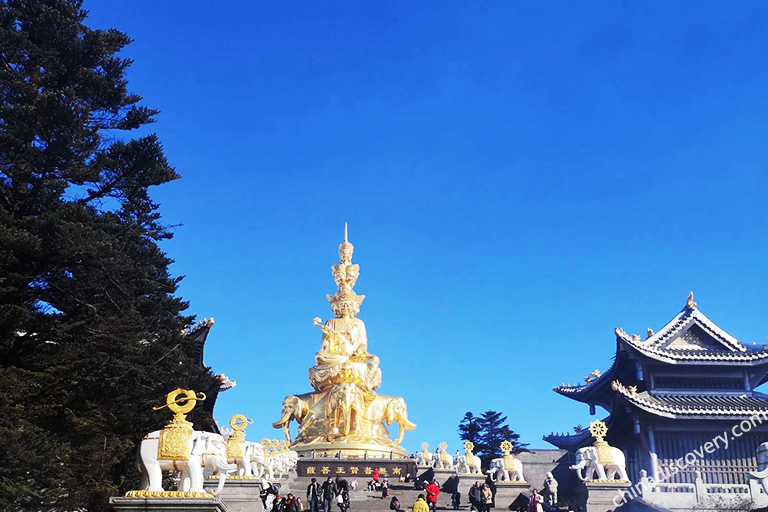 Golden Summit of Mount Emei
Golden Summit of Mount Emei
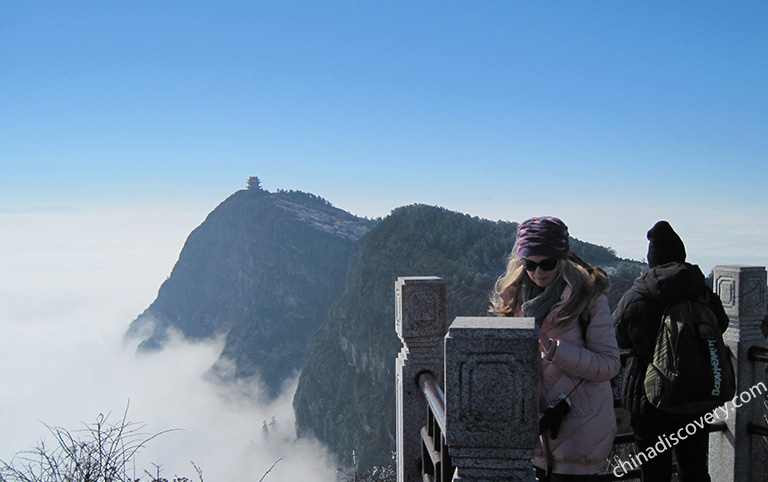 Stunning scenery of Cloud Sea on Golden Summit
Stunning scenery of Cloud Sea on Golden Summit
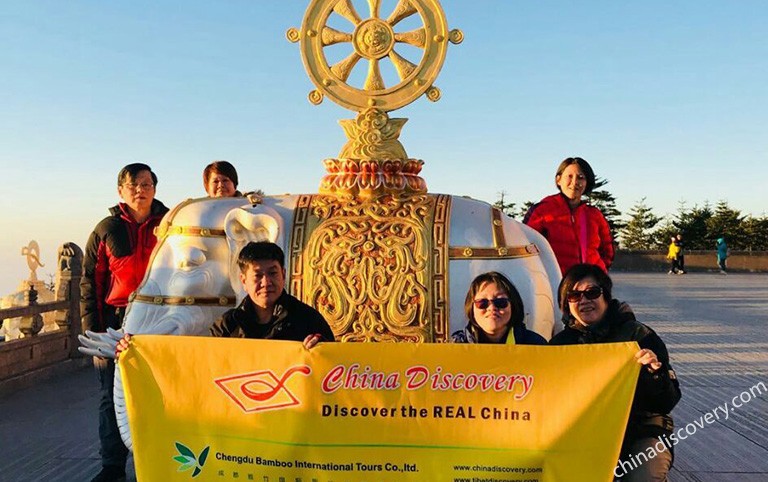 Our dear clients from Singapore on Golden Summit of Mount Emei
Our dear clients from Singapore on Golden Summit of Mount Emei
Based in Chengdu, China Discovery is your best partner to help you become an honorable panda keeper. During the past a few years, we have organized panda volunteering tours for hundreds of our clients to volunteer with pandas in Dujiangyan, Bifengxia and Wolong Panda Bases. During the program, volunteers are provided a rare opportunity to get a closer stay with the pandas. It is also a great chance to learn many interesting facts about pandas... Your efforts will ensure the future of giant pandas! Join Us Now!
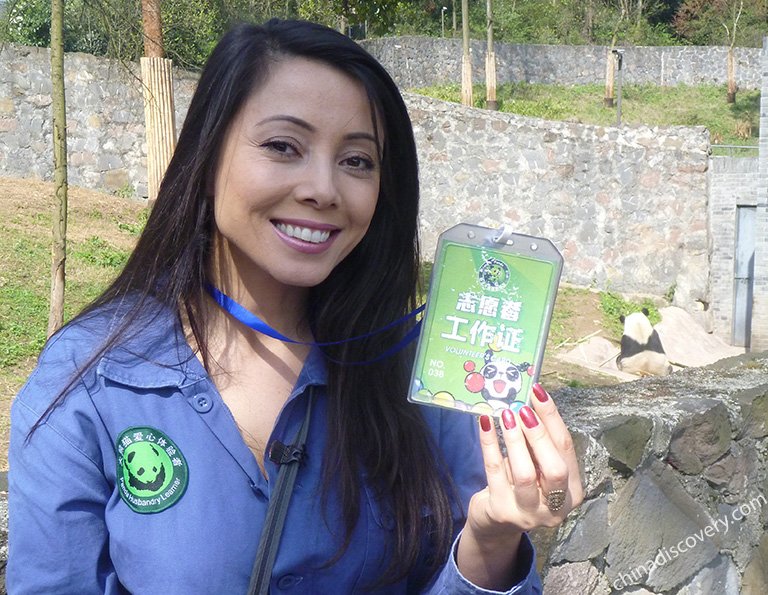
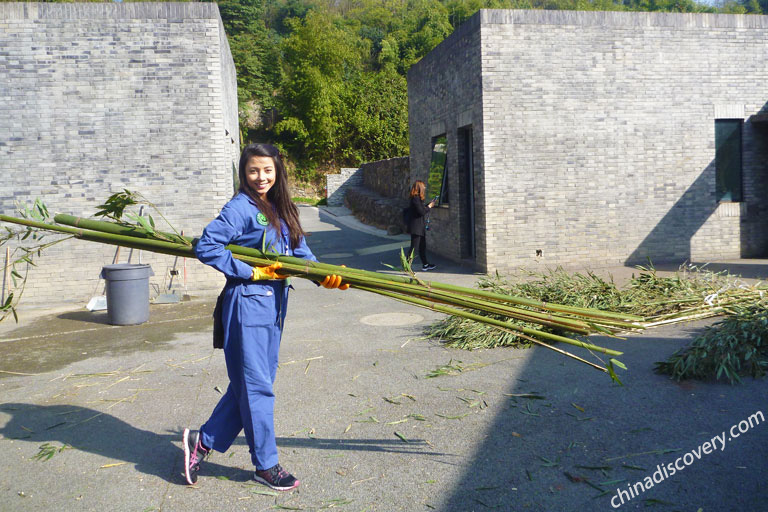
Chengdu / Leshan / Emei / Chengdu / Dujiangyan / Chengdu
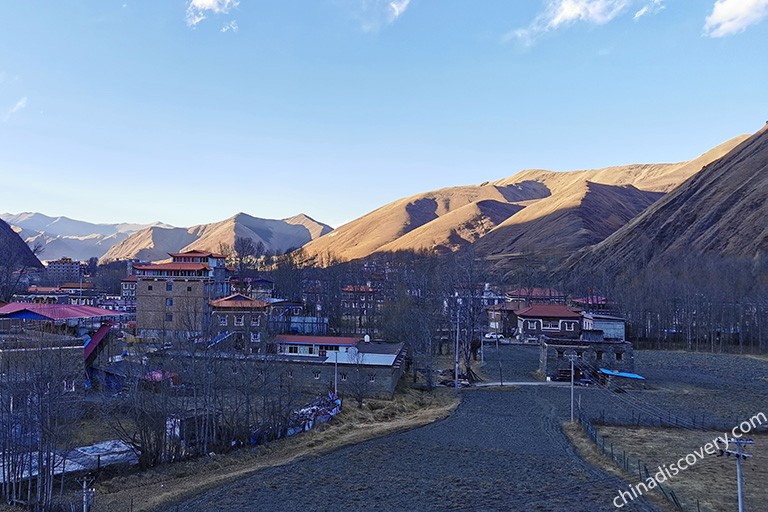
Chengdu / Dujiangyan / Mount Siguniang / Danba / Tagong / Xinduqiao / Hailuogou / Chengdu
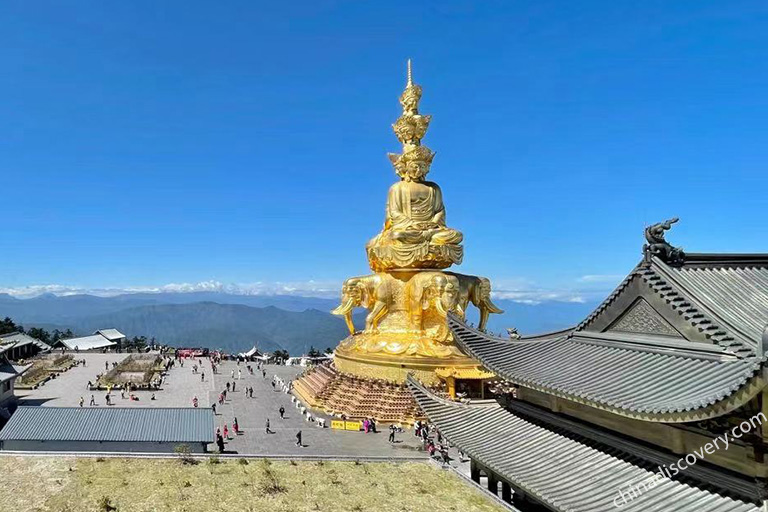
Chengdu / Leshan / Mt. Emei / Chengdu